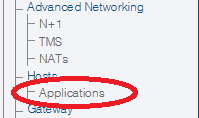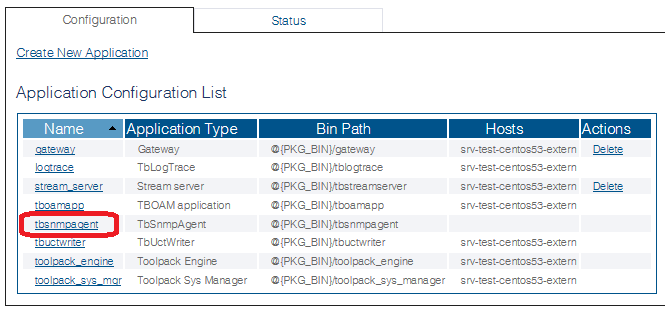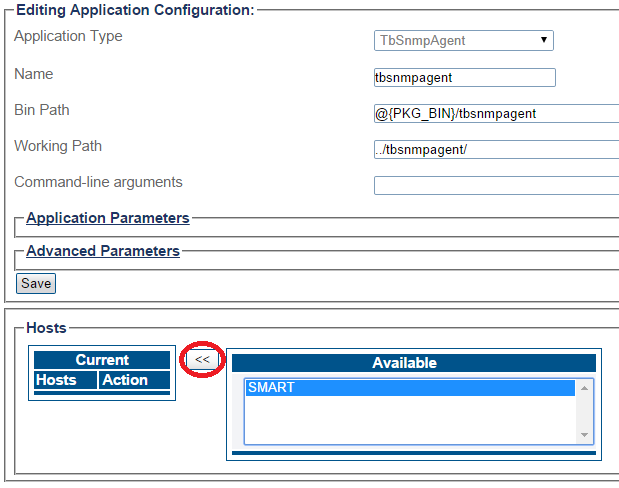Toolpack:Activating tbSnmpAgent B
(→Next Step) |
(→List of Parameters: Added links to parameter definitions) |
||
| Line 28: | Line 28: | ||
==List of Parameters== | ==List of Parameters== | ||
| + | * [[Parameter: Application Type|Application Type]] | ||
* [[Parameter: Name|Name]] | * [[Parameter: Name|Name]] | ||
| − | * [[Parameter: | + | * [[Parameter: Bin Path|Bin Path]] |
| − | + | ||
* [[Parameter: Location|Location]] | * [[Parameter: Location|Location]] | ||
| − | * [[Parameter: | + | * [[Parameter: Working Path|Working Path]] |
| − | * [[Parameter: | + | * [[Parameter: Commadn-line arguments|Command-line arguments]] |
| − | + | ||
| − | + | ||
| − | + | ||
<br> | <br> | ||
| − | + | <div class="mw-collapsible mw-collapsed" data-collapsetext="Application Parameters" data-expandtext="Application Parameters" style="width: 400px;"> | |
| − | <div class="mw-collapsible mw-collapsed" data-collapsetext=" | + | |
{| class="wikitable" | {| class="wikitable" | ||
|- | |- | ||
| − | * [[Parameter: | + | * [[Parameter: SNMP IP port|SNMP IP port]] |
| − | * [[Parameter: | + | * [[Parameter: SNMP System Description|SNMP System Description]] |
| − | * [[Parameter: | + | * [[Parameter: SNMP System Object ID|SNMP System Object ID]] |
| − | * [[Parameter: | + | * [[Parameter: SNMP System Name|SNMP System Name]] |
| − | * [[Parameter: | + | * [[Parameter: SNMP System Location|SNMP System Location]] |
| − | * [[Parameter: | + | * [[Parameter: SNMP System Contact|SNMP System Contact]] |
| − | + | ||
| − | + | ||
| − | + | ||
| − | + | ||
| + | * Advanced SNMP Parameters | ||
| + | ** [[Parameter: Polling delay to generate Traps|Polling delay to generate Traps]] | ||
| + | ** [[Parameter: Use system names|Use system names]] | ||
|} | |} | ||
| Line 60: | Line 55: | ||
<br> | <br> | ||
| + | <div class="mw-collapsible mw-collapsed" data-collapsetext="Advanced Parameters" data-expandtext="Advanced Parameters" style="width: 400px;"> | ||
| + | {| class="wikitable" | ||
| + | |- | ||
| + | * Log Parameters | ||
| + | * [[Parameter: Default Trace Level|Default Trace Level]] | ||
| + | * [[Parameter: Log File Path|Log File Path]] | ||
| + | * [[Parameter: Max Log File Segment Size|Max Log File Segment Size]] | ||
| + | * [[Parameter: Max Total Gzipped Log Files Size|Max Total Gzipped Log Files Size]] | ||
| + | |||
| + | * Network Lib Parameters | ||
| + | ** [[Parameter: Network Polling Delay|Network Polling Delay]] | ||
| + | ** [[Parameter: Network Switchover Delay|Network Switchover Delay]] | ||
| + | ** [[Parameter: Communication Down Delay|Communication Down Delay]] | ||
| + | |||
| + | |} | ||
| + | </div> | ||
== Next Step == | == Next Step == | ||
*Now that you have activated the SNMP agent application, you are ready to [[Toolpack:System_Settings_A#SNMP|configure the application for your needs]]. | *Now that you have activated the SNMP agent application, you are ready to [[Toolpack:System_Settings_A#SNMP|configure the application for your needs]]. | ||
Revision as of 10:07, 9 June 2015
Applies to version(s): v2.8.
Before you begin, verify that the selinux service is disabled, or else it will prevent the SNMP service from starting. Connect SSH to the unit's management port and follow these instructions:
docs.telcobridges.com/mediawiki/index.php/SELinux_management
Once you are logged on to the Web Portal, follow these steps to activate the tbSnmpAgent application:
1) Click Applications in the navigation panel.
2) In the Applications Configuration list, select tbsnmpagent.
3) In the Application Configuration information window, select the available host. Click << to move it to the current hosts list.
4) Returning to the Applications Status information window, the tbsnmpagent should now appear in a Ready / Run state, indicating that it is active.
List of Parameters
Next Step
- Now that you have activated the SNMP agent application, you are ready to configure the application for your needs.



